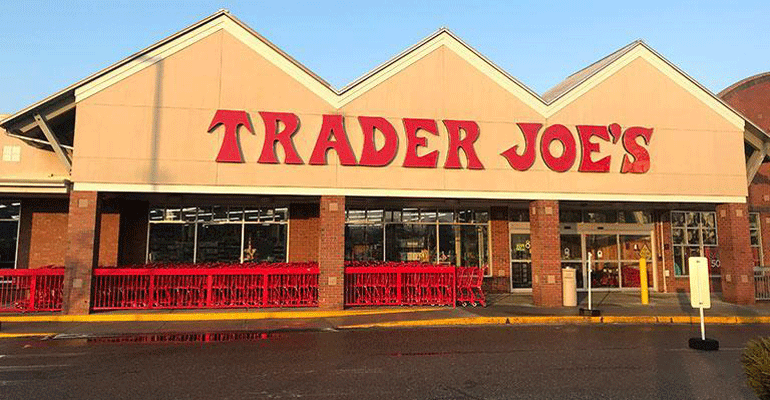
Rare is the person who has walked into a Trader Joe's in Chicago and not thought it must be fun to work there.
Everyone appears to be having a good time in their Hawaiian shirts and shorts, ringing bells and stacking fruity red wines. The checkout conversation is better than anywhere else in town. "What do you have planned for the weekend?" we're often asked with what feels like genuine curiosity. The staffers ("crew" in Trader Joe's parlance) are eclectic too: smart college kids, lively retirees, philosophical artsy types between gigs. We've often thought we'd enjoy the private-label conversations over the freezer cases.
Trader Joe's, a privately held chain founded by the late Joe Coulombe and now with headquarters in Monrovia, California, long has enjoyed a reputation for treating its workers well, too, even under the family of the late German supermarket mogul Theo Albrecht. It promises high pay with a potential 7% annual increase for crew. There's a 401(k) with a nice match, and the company says employee health premiums are as low as $25 a month. Add a hefty discount on groceries and a policy of promoting almost entirely from within and it sure looks like a cheery workplace where you'd consider sticking around for a while.
But on Monday, the Trader Joe's branch in Chicago's North Center neighborhood announced its staff planned to unionize, joining a number of other companies, such as Starbucks and the camping and outdoor retailer REI, that had operated with the presumption that they could create a better climate for their workers on their own and keep unions out by treating those employees well. Bartenders and customer service staffers at nonprofits such as Chicago's Goodman and Steppenwolf theatres and the Museum of Contemporary Art are turning to unions too. Some Goodman staffers are scheduled to vote their preference on April 18.
In the case of Starbucks, founder and former CEO Howard Schultz long prided himself on offering excellent health care, retirement benefits, stock options (which have proved lucrative over time) and even free college tuition not just to full-time employees, but part-timers as well. Schultz liked to refer to his workers as "partners" and promoted a socially progressive culture in his coffeehouses, which also seemed to be filled with atypically happy workers. Indeed, the generous benefits and tolerant culture are a big part of what historically has drawn many workers to Starbucks, now a coffee colossus. Schultz often referred to unions as "outside forces," breaking up carefully crafted relationships, hurting both sides.
REI says "we lead with our values, and we are creating a culture that inspires and enables everyone to bring their whole self and their highest ambitions to work every day, so that we can achieve more outside together."
It also calls itself a co-op. "Being a member-owned co-operative allows us to focus on shared values, not share value," it says. Union organizers, though, have said the word "co-op" is a smokescreen to imply that REI is more progressive than actually is the case.
So what happened? Why did the new, worker-friendly workplaces prove unable to keep their employees happy enough not to have to pay union dues? Was the union-free vision of the progressive employer always destined to fail?
Part of the issue here is a hangover from the pandemic when working at Starbucks during lockdown and isolation brought up a variety of worker challenges and, in the view of some, meant the company put front-line worker health behind profitability. Part of the issue surely is size: It's harder to have a close relationship between management and workers when companies see the kind of massive growth that has occurred at both Starbucks at Trader Joe's. And it's also due to the growing interest in unions by progressive young workers who might not have experience of the downsides, and the typically sympathetic media coverage that union drives at these stores receive.
Moreover, Starbucks and Trader Joe's now find themselves in a chaotic situation where some stores are unionized, some have elections and campaigns in progress, and some have rejected unionizing, making the companies vulnerable to the charge that they are juicing benefits at non-union stores just to keep unions out. Adding to the complications: Starbucks workers are involved with the massive hospitality union Workers United; Trader Joe's workers have formed their own bespoke union, putting them into an immediate legal battle with their employer over the right to sell totes or T-shirts with the Trader Joe's union logo.
What we're also seeing here is a big shift in union philosophy. Take, for example, Actor's Equity and the Screen Actors Guild, which once functioned as gatekeepers of the craft, requiring experience to join. More recently, they have dropped that idea in the name of equity and focused instead on organizing a much broader collection of workers.
We're all for the justly cherished rights of employees to join unions and gain the benefits of collective representation, even in non-traditional industries. This is especially true when and where employees are not treated well.
But that doesn't mean we cannot feel for Schultz and his ilk, the well-meaning entrepreneurs who tried their best to create workplaces that valued even part-time employees as partners, compensated them fairly, shared their profits with them and did their best to prove that management and workers could cooperate without outside influencers on the creation of mutually profitable and even fun operations. That vision didn't work out as they hoped. But it's still true in many small businesses in this city. We hope some of them can talk with their workers as to what is possible together.
Perhaps the most interesting business in this issue is Costco, the warehouse giant known for its generous stock options, which has meant some workers have retired as millionaires, given the huge rise in the stock price. When 200 workers at a warehouse in Norfolk voted to unionize last December, the Costco management response was: "To be honest, we're disappointed by the result in Norfolk. We're not disappointed in our employees; we're disappointed in ourselves as managers and leaders. The fact that a majority of Norfolk employees felt that they wanted or needed a union constitutes a failure on our part."
That's enlightened thinking. Costco looks like a good workplace to us too.
(COMMENT, BELOW)
Chicago Tribune
(TNS)
Previously:
• 02/20/24: Don't write off fake meat just yet
• 11/23/23: Critical thinking is losing out to TikTok. A Thanksgiving intervention might help
• 11/23/23: Did the maker of Oreos surreptitiously cut the creme-to-cookie ratio?
• 11/15/23: David Cameron, a former British PM, makes a surprise return as Suella Braverman gets the chop. Is there a lesson here for the US?
• 10/23/23: Turns out it's bad business to jack prices just because you can
• 09/28/23: Here's why President Joe Biden should not have joined the UAW picket line
• 07/28/23: Surprise! Some good news from the IRS
• 06/07/23: Supreme Court just fired a shot at delinquent property taxes
• 05/05/23: Can't force an unprofitable grocery store to remain open
• 03/06/23: A powerful paper comes clean about its 'China virus' coverage
• 02/08/22: Facebook flops and The New York Times buys a puzzle. What's going on?


 Contact The Editor
Contact The Editor
 Articles By This Author
Articles By This Author